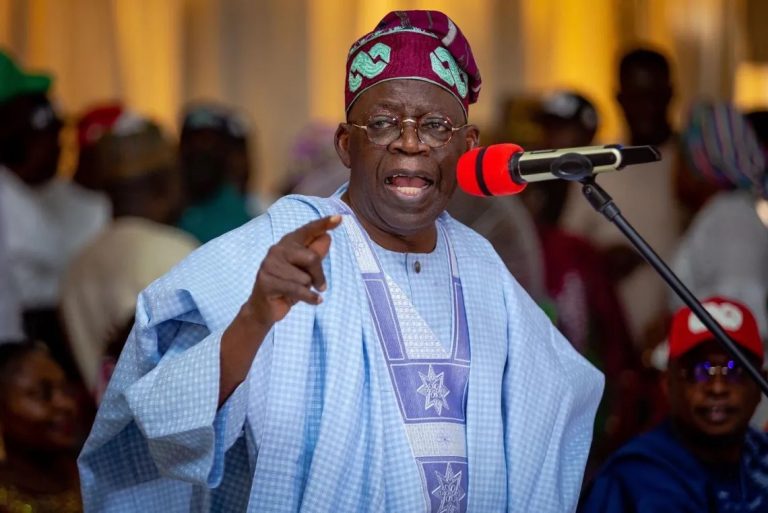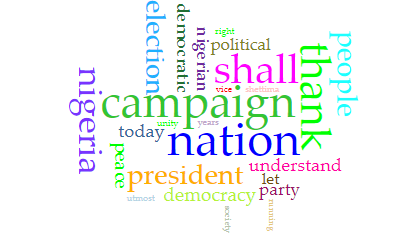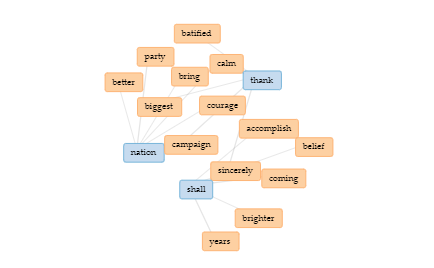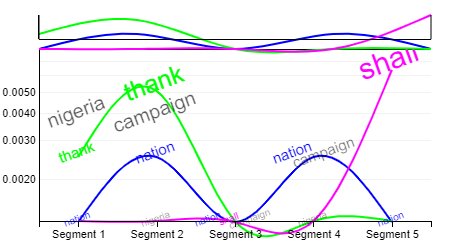
After several days of campaigning across the country by political parties, candidates, and supporters and voting on February 25, 2023, Nigeria eventually had a president-elect, Senator Bola Ahmed Tinubu, as the Constitution provides. From the campaign to the voting period, the political atmosphere was tense for every stakeholder. In this piece, our analyst examines the speech of the president-elect with a focus on how he uses referential and predicational strategies for positioning subjects in order to establish his new identity. Beyond this, our analyst discovered that the president-elect predominantly progresses from strengthening Nigeria’s democracy despite its current challenges to an appreciation of the kind of political competition the country experienced before the campaign, during the campaign and during the voting stages. He also moves to the youth, appreciating their doggedness and clamouring for a better Nigeria, where they could thrive without any hindrance.
Senator Tinubu stylishly refers to the different camps of his opponents, appreciating their roles during the electoral process that ensure sustained democracy for the country without foregrounding their offensive strategies and tactics against him during the period. In this regard, our analyst notes that the president-elect does not use the negative part of the referential strategy expected in formulating discourse. In other words, the president-elect considers appropriating the positive aspect of the strategy since he now wears a “national identity,” which demands that he embrace all competitors towards building a united Nigeria.
“You decided to place your trust in the democratic vision of a Nigeria founded on shared prosperity and one nurtured by the ideals of unity, justice, peace and tolerance. “Renewed hope has dawned in Nigeria,” is his nodal point statement that pinpoints the importance of appreciating the competitiveness of the election and the need for collectively building a sustainable democracy. The 791-word speech also entails predicational strategies premised on his agenda of renewed hope for Nigerians (see Exhibit 3).
Register for Tekedia Mini-MBA edition 19 (Feb 9 – May 2, 2026): big discounts for early bird.
Tekedia AI in Business Masterclass opens registrations.
Join Tekedia Capital Syndicate and co-invest in great global startups.
Register for Tekedia AI Lab: From Technical Design to Deployment (next edition begins Jan 24 2026).
Exhibit 1: Dominant words in his speech

Strengthened democracy
Whether you are Batified, Atikulated, Obidient, Kwankwasiyya, or have any other political affiliation, you voted for a better, more hopeful nation and I thank you for your participation and dedication to our democracy.
Finally, I thank the Nigerian people for their abiding belief in our democracy. I shall be a fair leader to all Nigerians. I will be in tune with your aspirations, charge up your energies and harness your talents to deliver a nation that we can be proud of.
Political competition
This was a competitive, high-spirited campaign. You have my utmost respect. Political competition must now give way to political conciliation and inclusive governance.
Exhibit 2: Connectivity of nation, shall and thank with his discourse elements

Youths and sustainable nation building
Now, to you, the young people of this country, I hear you loud and clear. I understand your pains, your yearnings for good governance, a functional economy and a safe nation that protects you and your future. I am aware that for many of you Nigeria has become a place of abiding challenges limiting your ability to see a bright future for yourselves. Remodeling our precious national home requires the harmonious efforts of all of us, especially the youth. Working together, we shall move this nation as never before.
Exhibit 3: Discursive movement of nation with other elements




